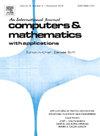抛物型偏微分方程时空FOSLS的aubin - nitsche型估计
IF 2.5
2区 数学
Q1 MATHEMATICS, APPLIED
引用次数: 0
摘要
我们为最近提出的热方程的一阶系统最小二乘有限元方法(FOSLS)开发了aubin - nitsche型估计。在一定的假设条件下,如果空间域是凸的,热源和初始基准是足够光滑的,我们证明了标量场变量近似的L2误差比整体误差收敛的速度更快。进一步证明了一个高阶守恒性质。此外,我们还讨论了弱规范下的拟最优性。数值实验证实了我们的理论发现。本文章由计算机程序翻译,如有差异,请以英文原文为准。
Aubin–Nitsche-type estimates for space-time FOSLS for parabolic PDEs
We develop Aubin–Nitsche-type estimates for recently proposed first-order system least-squares finite element methods (FOSLS) for the heat equation. Under certain assumptions, which are satisfied if the spatial domain is convex and the heat source and initial datum are sufficiently smooth, we prove that the error of approximations of the scalar field variable converges at a higher rate than the overall error. Furthermore, a higher-order conservation property is shown. In addition, we discuss quasi-optimality in weaker norms. Numerical experiments confirm our theoretical findings.
求助全文
通过发布文献求助,成功后即可免费获取论文全文。
去求助
来源期刊

Computers & Mathematics with Applications
工程技术-计算机:跨学科应用
CiteScore
5.10
自引率
10.30%
发文量
396
审稿时长
9.9 weeks
期刊介绍:
Computers & Mathematics with Applications provides a medium of exchange for those engaged in fields contributing to building successful simulations for science and engineering using Partial Differential Equations (PDEs).
 求助内容:
求助内容: 应助结果提醒方式:
应助结果提醒方式:


